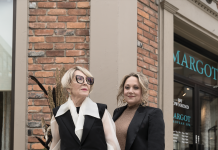
With all the disparaging labels being slapped on Detroit, here’s a new catchphrase we might be able to take to the bank:
DETROIT — Sex Capital of America.
Now, get your mind out of the abundance of glittery playrooms along Eight Mile. We’re talking about the study of sex, as it bolsters healthy, happy relationships and makes committed couples feel better — about each other, and about themselves. And metro Detroit has two accomplished, nationally known professionals who look at love from both sides now: the clinical and the academic.
Renee Horowitz, a board-certified gynecologist and obstetrician, is founder of the Center for Sexual Wellness in Farmington Hills and has made the exploration of sexual dysfunction in women her career calling. Magazines like Good Housekeeping and Esquire have her on speed dial when they need expert advice on sex, especially given her longstanding reputation that no subject is off limits.
And Terri Orbuch, aka “The Love Doctor,” is an Oakland University sociology professor and research scientist at the University of Michigan’s Institute for Social Research. She has authored five books (including her latest, Finding Love Again: 6 Simple Steps to a New and Happy Relationship) and is a regular guest on Fox 2. She has contributed to such talkfests as Katie and the Today show. She also recently became a national TV host with her first public broadcasting special, Secrets of the Love Doctor.
In the 90-minute info-fest, which aired in Detroit on WTVS (Channel 56), Orbuch polled a studio audience about relationship issues. Many of her insights come from asking for similar opinions on a massive scale — through an unprecedented, federally funded project that’s followed 373 Wayne County couples for 27 years, from the time they applied for their marriage licenses to the present.
Orbuch says nobody has studied midlife couples while having this much information about the early years of their marriages. “Even though we have a divorce rate of 46 percent, we know people still say relationships are the No. 1 important thing in their lives, over religion, work, money, everything. I hope to keep doing this until they’re gray and I’m gray … or grayer.”
No matter a person’s age, a lack of intimacy or satisfaction in the bedroom can put any relationship on the rocks. “Even when I was a resident,” Horowitz says, “I had women in their 30s and 40s come in and go, ‘I love my husband, but I’d just as soon go to bed with a book.”
Horowitz, a Farmington Hills–based OB/GYN, studied in California with world-renowned sexual medicine expert Dr. Michael Krychman.
While literature on sexual dysfunction has increased over the years, Horowitz believes it remains an area that many doctors simply don’t want to address. “I don’t think it’s the issue of it being personal,” she says. “For some [doctors] it is, but they also don’t have the time. When I sit down with a patient with a sexual problem, it’s at least an hour visit. It takes a certain knowledge, and quite honestly we don’t get reimbursed for it. When I was in medical school it was never talked about, so I talk to residents now about it.”
Not that patients always want to talk about sexual problems, either. “It’s what I call ‘the doorknob question,’ ” Horowitz says. “I see a woman for her yearly visit, I’m done talking to her, and my hand is literally on the doorknob when I hear, ‘Dr. Horowitz, one more thing.’ They don’t have any libido, or they have pain, or they can’t have an orgasm. It’s a huge discussion. So then I say, ‘Well, why don’t you come back and we’ll talk about it,’ and often they don’t.”
Is Horowitz surprised that some women find it hard to talk to a doctor about sex in this bare-all age? “You know, I think we’re still in a somewhat Victorian society,” she says, “and for some people it’s cultural; for others it’s whispered about.” Horowitz frequently appears at women’s-only social and charity events. Even then, women feel more comfortable writing their questions down.
“I think human sexuality is such an important part of our lives and our relationships that it needs to be talked about,” she says. “A healthy sex life improves so many other areas of your life.”
But only if they receive accurate and up-to-date information, says Orbuch, who might soon be hosting her own TV show — a possibility heightened after a PR professional recently coined for her the catchy alias “The Love Doctor.”
“I was writing these academic books that my husband never even read,” she says, “but I was listening to these Dr. Phil and Dr. Laura people …talking about relationships but telling people things that I was finding the opposite to be true.”
One of those things is that couples should talk about everything and anything. But Orbuch finds there are some taboo topics that people just can’t talk about in their relationships — not even long-term couples. “They know they have to agree to disagree,” she says. “Dr. Phil would be saying you always have to be honest, to ‘let it all out,’ but I was finding that even happily married couples have touchy subjects.”
Orbuch continues to teach at Oakland, where her classes include the Sociology of Human Sexuality. “That one fills up totally,” she says, laughing. “People get to class thinking they’re going to be able to talk about their own sex lives and relationships, and that’s not the case. Many people drop [it] after the first two days.”
|
|
|









